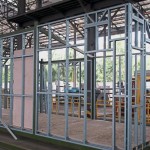The Construction Industry Development Board (CIDB) revealed on Wednesday (28 March) that the country is slow in the adoption of the industrialised building system (IBS) technology, reported The Malaysian Reserve.
Malaysia presently lags 20 years in the usage of this new technology due to the failure of construction companies and IBS materials supplier to reach a consensus on its wide implementation, said CIDB Chairman Tan Sri Dr Ahmad Tajuddin Ali.
“Construction players who want to use IBS say the components are not available, while IBS producers tell the industry that there is no market to consume their components, and the two do not meet.”
He noted that during the past two decades, the authorities have been urging the construction sector to take advantage of IBS to boost productivity and reduce its over-reliance on overseas manpower.
“The Malaysian Industry-Government Group for High Technology (MIGHT) had established a task force in the mid-90s proposing for the encouragement of this technology to enhance productivity, enhance safety, reduce environment impact, as well as curb foreign workers in this sector,” said Ahmad Tajuddin, who is also a board member of the group.”
At present, Malaysia has more than seven million foreign workers, of which 107,156 work in construction sites and are registered with CIDB.
The adoption of IBS, which is in line with the government’s Construction Industry Transformation Programme (CITP) 2016, also targets to increase productivity by over 2.5 times by 2020.
“As at 2016, the productivity per worker in the construction industry was RM40,018, which is a significant increase from RM22,464 per worker in 2011. Through the initiative, the government sets to achieve up to RM62,000 productivity per worker in 2020,” he noted.
At present, two major construction firms – Country Garden and Gamuda Bhd – are developing their own IBS technology. In fact, the former is building factories for making IBS components for its projects, like Forest City off Johor.
“But they are doing it for their internal needs,” noted Ahmad Tajuddin, adding that Gamuda is expanding its capacity to provide IBS materials to other construction firms.
Meanwhile, Master Builders Association Malaysia (MBAM) said the slow implementation of IBS is caused by problems like high investment cost, economy of scales and standardisation of components size
“There are about 230 suppliers of IBS components in Malaysia, which indicate that the slow adoption is not due to the supply issue,” said MBAM President Foo Chek Lee.
“In addition, most of the suppliers are only operating at 50 percent to 60 percent capacity due to lack of demand,” he said, adding the issue for the wide adoption of IBS is primarily its cost.
To encourage its usage in the private sector, all developments valued at above RM50 million will be required to achieve a minimum IBS score point of 50 under the CITP programme. This has been implemented in phases from 2018 before full enforcement by 2020.
This article was edited by the editorial team of PropertyGuru. To contact them about this or other stories email editorialteam@propertyguru.com.my
For the latest property news, trends, resources and expert opinions, visit our Property News section. Home buyers, sellers or property renters looking for Malaysian Properties, may like to visit the New Launches or Project Reviews page.




